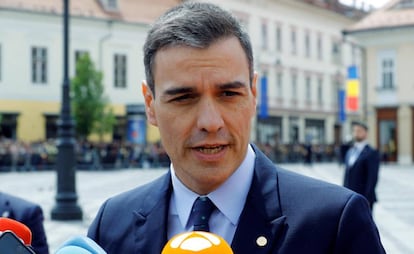Acting PM to Catalan independence parties: Don’t veto choice for Senate speaker
Blocking the appointment of Miquel Iceta, a man who “builds bridges,” would be “a bad start,” says Pedro Sánchez of the Socialist Party

In the wake of the April 28 Spanish general election, the new political term appears set to begin the way it ended: with huge tensions between acting Prime Minister Pedro Sánchez and Catalan pro-independence parties.
Spaniards were called to the polls late last month after the Socialist Party (PSOE) chief Pedro Sánchez – who came to power last June off the back of a successful vote of no-confidence against former PM Mariano Rajoy – failed to garner the cross-party support he needed to get his budget plan passed by Congress.
The Catalan parties are threatening to cause more trouble for Sánchez, even before a government has been formed
The PSOE was in a delicate position, with just 84 deputies in a lower house were 176 votes are needed for a majority. And it was the Catalan independence parties – the Catalan Republican Left (ERC) and the Catalan European Democratic Party (PDeCAT) – who decided to withdraw their support for the 2019 spending plan, which had been agreed between the PSOE and the left-wing coalition Unidas Podemos. They wanted more concessions from Sánchez over the independence drive, such as discussions on a negotiated referendum. They also wanted government intervention regarding the secessionist leaders who are currently on trial in the Supreme Court, several of whom are being held in custody as that process takes place.
Now, in the wake of the inconclusive elections, which saw the Socialists take the most seats but fall short of a majority, the Catalan parties are threatening to cause more trouble for Sánchez, even before a government has been formed.
On Wednesday, it emerged that the acting prime minister had chosen Miquel Iceta, the leader of the PSC (the Catalan branch of the PSOE), for the role of speaker in Spain’s upper house of parliament, the Senate.
Before he can take that position, Iceta must be voted in by the Catalan parliament as a regional senator. The pro-independence parties are threatening to veto that support, meaning that Iceta would need the help of center-right group Ciudadanos (Citizens) to be successful at the vote. Ciudadanos is openly hostile to the PSOE, and is unwilling to do any deals in Congress to assist Sánchez in his bid to form a government.
The choice of Iceta was symbolic, given the ongoing tensions between the central government in Madrid and Catalonia, which has been immersed for years in a pro-independence drive that peaked in late 2017, when an illegal referendum on secession was held, and a unilateral declaration of independence passed in the regional parliament. Iceta is a figure who has always supported dialogue as a means to solve the differences between the region and the rest of Spain, and he has also talked about the possibility of government pardons should the pro-independence leaders currently being tried in the Supreme Court end up with jail sentences.
But the response from regional parties to the choice of Iceta was not the one that the PSOE had expected. Arriving at an informal European Union summit in Romania today, Sánchez called on the Catalan independence parties to rethink their veto.
The choice of Iceta was symbolic, given the ongoing tensions between the central government in Madrid and Catalonia
“Spaniards and Catalans have spoken, and they have opted for forces such as the PSOE, which is defending dialogue and an end to confrontation,” the acting prime minister told reporters. “Society has said that it wants the PSOE to govern and to continue with policies of peaceful coexistence. What I am calling for is that they allow us to exercise our right to be able to choose the senatorial representatives in Madrid. I hope that the independence forces reconsider, that they leave to one side the veto, deadlock and polarization, and that we can think about revitalizing the Senate as a territorial chamber and revitalizing our state model based on devolved powers to the regions. Vetoing someone who has always defended dialogue, who has built bridges, is a bad start. I hope that they will respect us as we have always respected the right of all forces to choose their representatives.”
English version by Simon Hunter.
Tu suscripción se está usando en otro dispositivo
¿Quieres añadir otro usuario a tu suscripción?
Si continúas leyendo en este dispositivo, no se podrá leer en el otro.
FlechaTu suscripción se está usando en otro dispositivo y solo puedes acceder a EL PAÍS desde un dispositivo a la vez.
Si quieres compartir tu cuenta, cambia tu suscripción a la modalidad Premium, así podrás añadir otro usuario. Cada uno accederá con su propia cuenta de email, lo que os permitirá personalizar vuestra experiencia en EL PAÍS.
¿Tienes una suscripción de empresa? Accede aquí para contratar más cuentas.
En el caso de no saber quién está usando tu cuenta, te recomendamos cambiar tu contraseña aquí.
Si decides continuar compartiendo tu cuenta, este mensaje se mostrará en tu dispositivo y en el de la otra persona que está usando tu cuenta de forma indefinida, afectando a tu experiencia de lectura. Puedes consultar aquí los términos y condiciones de la suscripción digital.








































